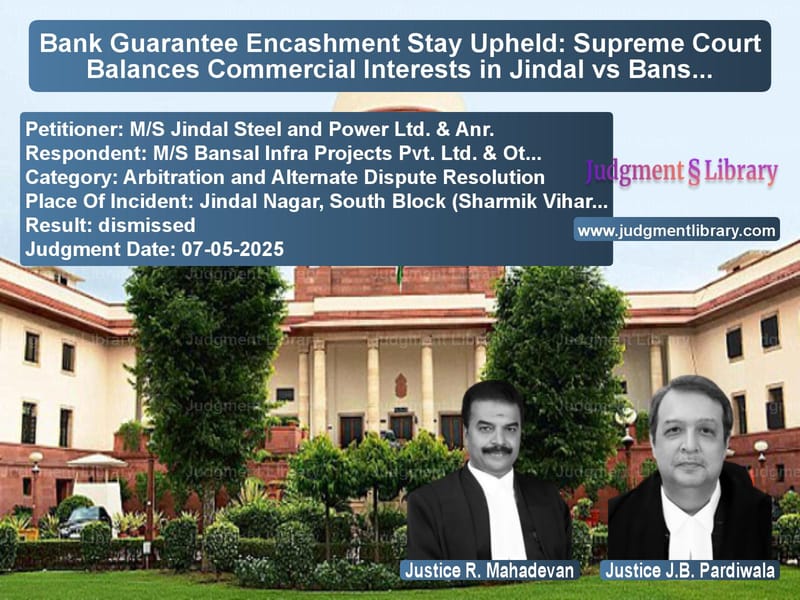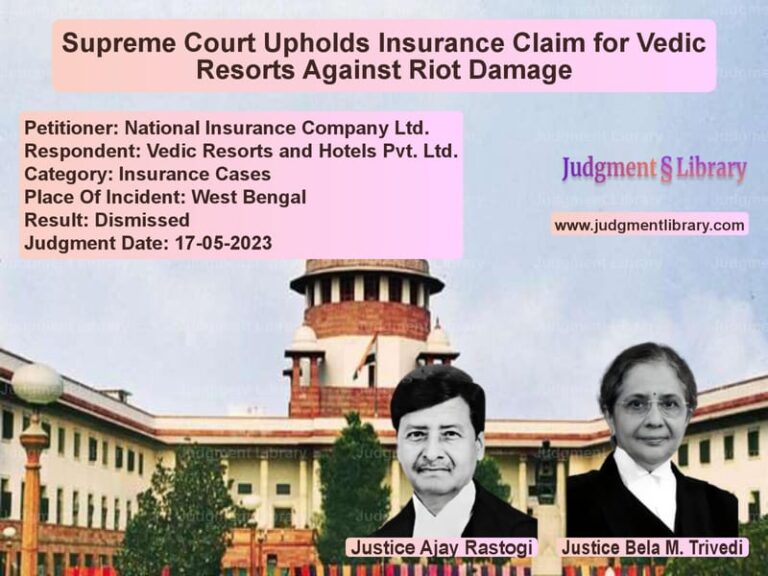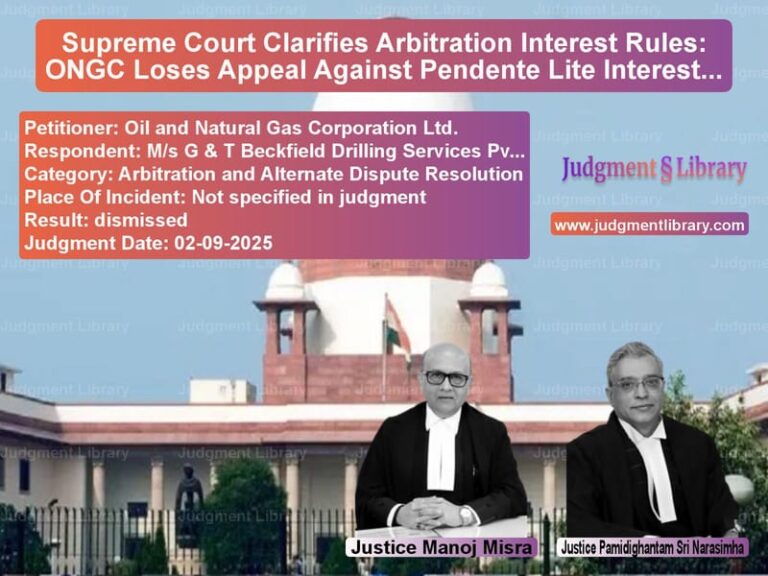Bank Guarantee Encashment Stay Upheld: Supreme Court Balances Commercial Interests in Jindal vs Bansal Infra Dispute
In a significant ruling that balances commercial interests with legal principles, the Supreme Court of India has recently addressed the complex interplay between arbitration proceedings and bank guarantee encashment. The case between Jindal Steel and Power Ltd. and Bansal Infra Projects Pvt. Ltd. presents a classic commercial dispute where contractual obligations, performance issues, and financial securities converge, creating a legal labyrinth that required judicial intervention at multiple levels.
The dispute originated from a construction project at Jindal Nagar, South Block (Sharmik Vihar), where Jindal Steel and Power Ltd. had engaged Bansal Infra Projects Pvt. Ltd. for constructing 400 flats. The work order dated January 24, 2022, valued at approximately Rs. 44 crore, came with an advance payment of Rs. 3.73 crore, secured by an irrevocable and unconditional bank guarantee. The project, initially scheduled for completion within eight months, saw multiple extensions amid allegations of poor performance, quality deficiencies, and missed deadlines from Jindal’s side, while Bansal countered with claims of delays in material supply and payment releases from Jindal.
The situation escalated when Jindal terminated the work order and demanded refund of the debit balance of Rs. 4.12 crore, threatening to encash the bank guarantee if payment wasn’t made by April 30, 2024. This triggered a series of legal maneuvers, with Bansal approaching the Commercial Court under Section 9 of the Arbitration and Conciliation Act, 1996, seeking interim protection against the encashment of the bank guarantee. When the Commercial Court refused to grant ex parte injunction and directed issuance of notice, Bansal moved the High Court under Article 227 of the Constitution, which granted interim protection, leading to the present appeal before the Supreme Court.
The Legal Battle Over Jurisdiction and Remedies
The core of the legal dispute revolved around the appropriate forum and remedy for challenging the Commercial Court’s order. Jindal Steel and Power Ltd., represented by their counsel, argued vehemently that the High Court should not have exercised its supervisory jurisdiction under Article 227 when an equally efficacious alternative remedy was available. The appellants contended that “an order passed in an application under Order XXXIX Rule 3 CPC for an ex parte ad interim injunction is, in essence, an order passed in a Section 9 arbitration petition. Therefore, Respondent No. 1 had an equally efficacious alternative remedy available by way of an appeal under Section 37(1)(b) of the Arbitration and Conciliation Act, 1996.”
Elaborating on this position, Jindal’s counsel submitted that “the High Court in utter disregard of settled principles, entertained a writ petition under Article 227 of the Constitution of India on an incorrect premise that the non-grant of exemption under Order XXXIX Rule 3 CPC is not appealable either under CPC or under the Commercial Courts Act, 2015.” The appellants emphasized that “the use of the word ‘any’ in Section 37(1)(b) is clearly all-inclusive and extends to a refusal to grant ex parte interim measures under Section 9.”
Furthermore, Jindal’s counsel raised concerns about parallel proceedings, stating that “it is an established principle of law that parties must be prevented from initiating parallel proceedings before courts so as to avoid delaying the arbitral process. However, in the present case, the respondent invoked arbitration through its letter dated 13.05.2024, while simultaneously engaging in court proceedings to obtain a stay on the encashment of the bank guarantee – first from the commercial court and subsequently from the High Court. Such a course of action is untenable and contrary to the spirit of the Arbitration and Conciliation Act, 1996.”
On the substantive issue of bank guarantee encashment, Jindal’s counsel argued that “the court should not interfere with the invocation of a bank guarantee so long as the invocation is in accordance with the terms of the bank guarantee. Accordingly, the High Court ought not to have interdicted the encashment of an unconditional bank guarantee, in the absence of any element of fraud or special equities in favour of Respondent No.1.”
Bansal’s Defense of Special Equities and Procedural Necessity
Bansal Infra Projects Pvt. Ltd., through their counsel, mounted a robust defense of the High Court’s order, emphasizing the practical realities and potential irreparable harm. The respondent’s counsel clarified that “the challenge pertains solely to the grant of interim relief staying the invocation of the bank guarantee during the pendency of the proceedings under Section 9 of the Arbitration and Conciliation Act, 1996.” They highlighted that the Section 9 arbitration petition had already been partly heard, with arguments concluded for their side, and the matter pending final arguments from Jindal.
On the jurisdictional issue, Bansal’s counsel presented a detailed legal analysis, stating that “an appeal under Section 37(1)(b) of the Arbitration and Conciliation Act, 1996, is maintainable only against an order granting or refusing to grant any measure under Section 9 of the Act. However, a careful reading of Section 37 indicates that such an appeal lies solely against a final order passed under Section 9, and not against an interim order passed under Order XXXIX Rule 3 CPC, even if such an order is passed in proceedings under Section 9 of the Act.”
The respondent further elaborated on the procedural constraints, noting that “under Section 8 of the Commercial Courts Act, 2015, there is an express bar against filing a revision application or petition against an interlocutory order passed by a commercial court. In the present case, since the order dated 30.04.2024 passed by the Commercial Court is an interim order, Respondent No.1 could not have filed a revision application or petition under the Commercial Courts Act.”
Regarding the bank guarantee itself, Bansal’s counsel argued that “the appellants have acted contrary to the terms of the bank guarantee which was furnished to secure the advance given by the appellants to Respondent No. 1.” They emphasized that “the High Court has examined the pleadings of the parties, the communications and the clauses of the contract and bank guarantee, and has arrived at a prima facie view that ‘special equities’ are in favour of Respondent No. 1, and held that permitting the appellants to invoke and encash the bank guarantee would result in irretrievable injustice to Respondent No. 1.”
Demonstrating their bona fides, Bansal’s counsel highlighted that “the appellants vide letter dated 25.03.2024 claimed a debit balance of Rs. 4,12,54,904/- against Respondent No.1 due to unadjusted advances and alleged non-compliance with work order terms. Further, the appellants would proceed to encash the bank guarantee of Rs.3,73,95,490/- executed by Respondent No. 1, if payment was not made by 30.04.2024. According to the learned counsel, the alleged non-compliance was only due to the delays caused by the appellants and hence, invocation and encashment of the bank guarantee without proper adjudication would be unjust.”
The Supreme Court’s Balancing Act
The Supreme Court, comprising Justices J.B. Pardiwala and R. Mahadevan, navigated through these competing arguments with a pragmatic approach that prioritized the preservation of rights while allowing the arbitration process to proceed. The Court acknowledged the established legal principles governing bank guarantees but focused on the practical realities of the case.
The Court recognized the settled legal position regarding bank guarantees, quoting from its earlier decision in Hindustan Construction Co. Ltd v. State of Bihar and others: “Now, a bank guarantee is the common mode of securing payment of money in commercial dealings as the beneficiary, under the guarantee, is entitled to realise the whole of the amount under that guarantee in terms thereof irrespective of any pending dispute between the person on whose behalf the guarantee was given and the beneficiary.”
The judgment further elaborated on the limited grounds for interference with bank guarantee encashment: “It is for this reason that the courts are reluctant in granting an injunction against the invocation of bank guarantee, except in the case of fraud, which should be an established fraud, or where irretrievable injury was likely to be caused to the guarantor.”
However, the Court also noted the specific circumstances of the case that justified the interim protection: “After hearing both sides and with the consent of the parties, the High Court disposed of the writ petition by the order impugned herein, inter alia stating that if the appellants were permitted to invoke the bank guarantee, the prayer made in the Section 9 arbitration petition would likely become infructuous.”
The Supreme Court emphasized that “the High Court clearly observed that the Commercial Court shall proceed in accordance with law and adjudicate upon the prayers made in the arbitration petition on its own merits, considering the pleadings and documents placed on record, without being influenced by any of the observations made therein.” Thus, the Court viewed the High Court’s order “as merely an interim measure intended to protect the interests of both parties.”
Practical Considerations and Ongoing Proceedings
What significantly influenced the Supreme Court’s decision were the practical developments in the case. The Court noted that “Respondent No. 1 initiated arbitration proceedings to resolve the disputes with the appellants. In the Section 9 arbitration petition filed by them, the arguments on behalf of Respondent No. 1 and Respondent No. 2 have already been concluded, and the matter stands partly heard, pending further arguments on behalf of the appellants.”
Furthermore, the Court highlighted the progress in the arbitration process: “Pursuant to the order dated 06.11.2024 passed by the High Court, an Arbitral Tribunal was constituted to adjudicate the disputes between the parties and a hearing was held on 03.01.2025, during which, the parties involved herein appeared and the Arbitral Tribunal directed them to file statement of claim, statement of defence and counter claim, if any, and reply to the same.”
The Court found compelling the fact that “in view of the ongoing arbitration proceedings concerning the bank guarantee, it is imperative to maintain the existing position regarding the bank guarantee until the final outcome of the Section 9 arbitration petition.”
Another crucial factor was Bansal’s compliance with the High Court’s directions and their continued cooperation. The Court noted that “as directed by the High Court, Respondent No. 1 renewed the bank guarantee till 31.12.2024, which was subsequently, extended till 30.06.2025 pursuant to the directions of this Court. Furthermore, the learned counsel for Respondent No. 1 has given an undertaking to extend the validity of the bank guarantee till the disposal of the Section 9 arbitration petition.”
This practical compliance led the Court to conclude that “no prejudice whatsoever is occasioned to the appellants, for the present.”
Strategic Avoidance of Broader Legal Questions
In a strategically significant move, the Supreme Court consciously avoided deciding the broader legal questions raised by Jindal regarding the maintainability of the writ petition under Article 227 and the appealability of interim orders under Section 37 of the Arbitration Act. The Court explicitly stated that “we will not decide the legal issues raised herein and the same are left open.”
This approach allowed the Court to focus on the immediate practical resolution while preserving the larger legal questions for an appropriate case where they would be determinative of the outcome. The Court recognized that since the substantive arbitration proceedings were well advanced and the bank guarantee had been duly extended, the practical need for immediate resolution outweighed the theoretical importance of settling the jurisdictional questions.
Directions for Expedited Resolution
The Supreme Court concluded by providing clear directions for the expeditious resolution of the underlying dispute. The Court directed that “since the Section 9 arbitration petition is now ripe for arguments before the Commercial Court on behalf of the appellants, the parties are directed to advance all their contentions along with necessary documents, and the Commercial Court shall pass appropriate orders within a period of eight weeks thereafter.”
The Court maintained the interim protection, stating that “until such time, the bank guarantee shall be kept alive and shall be subject to the outcome of the Section 9 arbitration petition.”
Broader Implications for Commercial Disputes
This judgment, while specifically dealing with the facts of the Jindal-Bansal dispute, has broader implications for commercial dispute resolution in India. It demonstrates the Supreme Court’s preference for practical solutions that allow commercial and arbitration processes to proceed without premature judicial intervention that might undermine the entire dispute resolution framework.
The Court’s approach balances the sanctity of bank guarantees as commercial instruments with the need to prevent irreparable harm during pending arbitration. By requiring the bank guarantee to be kept alive rather than allowing its encashment, the Court ensures that both parties’ interests are protected—Jindal’s interest in having security for their claims, and Bansal’s interest in not suffering irreparable financial harm before the arbitration determines the actual rights and liabilities.
The judgment also reflects the Court’s understanding of the realities of commercial litigation, where procedural technicalities should not override substantive justice, especially when the arbitration process is actively underway and nearing resolution.
For businesses and legal practitioners, this case serves as a reminder of the importance of maintaining bank guarantees during dispute resolution processes and the courts’ willingness to provide interim protection when justified by the circumstances. It also highlights the strategic considerations in choosing the appropriate forum for challenging interim orders in arbitration proceedings.
Ultimately, the Supreme Court’s disposition of the case promotes the objectives of the Arbitration and Conciliation Act, 1996—minimal judicial intervention and expeditious resolution of disputes—while ensuring that interim measures do not render the main proceedings infructuous. The judgment strikes a careful balance between commercial certainty and procedural fairness, contributing to the development of a robust dispute resolution ecosystem in India.
Petitioner Name: M/S Jindal Steel and Power Ltd. & Anr..Respondent Name: M/S Bansal Infra Projects Pvt. Ltd. & Others.Judgment By: Justice R. Mahadevan, Justice J.B. Pardiwala.Place Of Incident: Jindal Nagar, South Block (Sharmik Vihar).Judgment Date: 07-05-2025.Result: dismissed.
Don’t miss out on the full details! Download the complete judgment in PDF format below and gain valuable insights instantly!
Download Judgment: ms-jindal-steel-and-vs-ms-bansal-infra-pro-supreme-court-of-india-judgment-dated-07-05-2025.pdf
Directly Download Judgment: Directly download this Judgment
See all petitions in Commercial Arbitration
See all petitions in Enforcement of Awards
See all petitions in Arbitration Act
See all petitions in Dispute Resolution Mechanisms
See all petitions in Contract Disputes
See all petitions in Judgment by R. Mahadevan
See all petitions in Judgment by J.B. Pardiwala
See all petitions in dismissed
See all petitions in supreme court of India judgments May 2025
See all petitions in 2025 judgments
See all posts in Arbitration and Alternate Dispute Resolution Category
See all allowed petitions in Arbitration and Alternate Dispute Resolution Category
See all Dismissed petitions in Arbitration and Alternate Dispute Resolution Category
See all partially allowed petitions in Arbitration and Alternate Dispute Resolution Category







